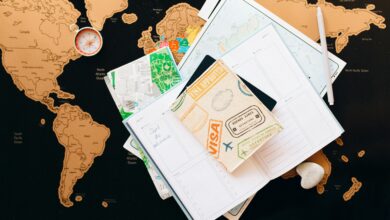
Understanding the common reasons for visa denials is crucial for applicants navigating the complex landscape of visa applications. This article aims to shed light on the various factors that contribute to visa denials and provides actionable insights on how to avoid them. Navigating the visa application process requires careful attention to detail and an understanding of the pitfalls that can lead to unfavorable outcomes.
The Visa Application Process: An Overview
The journey towards obtaining a visa involves several stages, each demanding meticulous attention from applicants. From document preparation to demonstrating financial stability and establishing strong ties to the home country, every step plays a pivotal role in the approval process. However, despite thorough efforts, visa denials can occur, often due to common reasons that applicants may overlook.
Common Reasons for Visa Denials
Insufficient Documentation
Thorough document preparation is the backbone of a successful visa application. Insufficient or overlooked documents can lead to denials. Examples include forgetting to include a crucial financial statement, neglecting to provide proof of accommodation, or failing to present a comprehensive travel itinerary.
Financial Inadequacy
Financial stability is a key criterion for visa approval. Inadequate financial documentation or presenting unclear financial statements can result in denials. Applicants must meticulously showcase their ability to cover expenses during their stay and return home.
Lack of Strong Ties to Home Country
Immigration authorities assess an applicant’s ties to their home country to gauge the likelihood of a return. Insufficient evidence of strong ties, such as employment stability, property ownership, or family connections, can be a red flag for visa denials.
Inconsistencies in Information
Consistency in information provided across the application is paramount. Discrepancies between details in the application form, supporting documents, and responses during interviews can raise concerns, leading to denials.
Failure to Meet Legal Requirements
Visa applications must adhere to specific legal requirements. Failure to meet these requirements, whether related to health screenings, background checks, or other criteria, can result in denials. It is essential to thoroughly understand and comply with all legal prerequisites.
Understanding the Impact of Visa Denials
The repercussions of a visa denial extend beyond the immediate setback. Denials can impact future applications, creating a challenging situation for applicants seeking to travel for work, study, or leisure. Therefore, it is crucial to comprehend the implications and take proactive measures to avoid denials.
How to Avoid Common Pitfalls and Improve Approval Chances
Thorough Document Preparation
To avoid document-related denials, applicants should meticulously prepare all required documents. This includes passports, financial statements, letters of invitation, and any additional documents specific to the visa category.
Certified translations and verifications of documents not in the official language of the host country can further enhance the credibility of the application.
Financial Planning and Transparency
Applicants must transparently demonstrate their financial capacity. This involves providing clear and detailed financial statements, including bank statements, income tax returns, and evidence of employment or business ownership.
Clear communication of the purpose and duration of the trip can contribute to a better understanding of financial needs.
Building Strong Ties to the Home Country
To strengthen ties to the home country, applicants can take several actions. These may include maintaining stable employment, owning property, or highlighting family connections. Providing evidence of commitments and responsibilities in the home country reinforces the intent to return.
Ensuring Consistency in Information
Applicants should carefully review all details provided in the application, supporting documents, and interviews to ensure consistency. Cross-verifying information before submission can help identify and rectify any discrepancies.
Legal Compliance and Seeking Professional Advice
Understanding and complying with legal requirements is paramount. Applicants should familiarize themselves with the specific criteria for their visa category and seek professional advice when faced with complex legal considerations.
Professional advice can be particularly beneficial for individuals with unique circumstances or those applying for visas with stringent requirements.
Success Stories: Learning from Others’ Experiences
Real-life success stories provide valuable insights into overcoming visa denials. By learning from the experiences of others who faced initial setbacks but ultimately secured approvals, applicants can gain inspiration and guidance. These stories illustrate the importance of persistence, strategic planning, and seeking assistance when needed.
Conclusion
In conclusion, understanding the common reasons for visa denials is crucial for any applicant. By addressing potential pitfalls related to documentation, financial planning, ties to the home country, information consistency, and legal compliance, applicants can significantly improve their chances of a successful visa application. Navigating the visa application process requires diligence, attention to detail, and proactive measures to avoid common pitfalls. Learning from the experiences of others and seeking professional advice when needed further enhances the chances of a positive outcome.
FAQs
- How can applicants ensure the accuracy of translated documents for visa applications?
- Applicants can ensure accuracy by using certified translation services and cross-verifying translations with reputable professionals.
- Are language proficiency tests mandatory for all visa categories?
- No, language proficiency requirements vary by visa category. Applicants should check specific requirements for their intended visa.
- What online tools can help applicants overcome language challenges in the visa application process?
- Online tools provided by immigration authorities, such as language guides and translation services, can assist applicants in overcoming language challenges.
- Can language barriers affect visa approvals even if all documentation is in order?
- Yes, language barriers can impact the visa interview process. Clear verbal communication is essential for expressing intent and responding to questions effectively.
- How can applicants continue to improve language skills post-approval for a smoother transition?
- Applicants can engage in language exchange programs, online language courses, and immersive language experiences to continue improving language skills post-approval.

